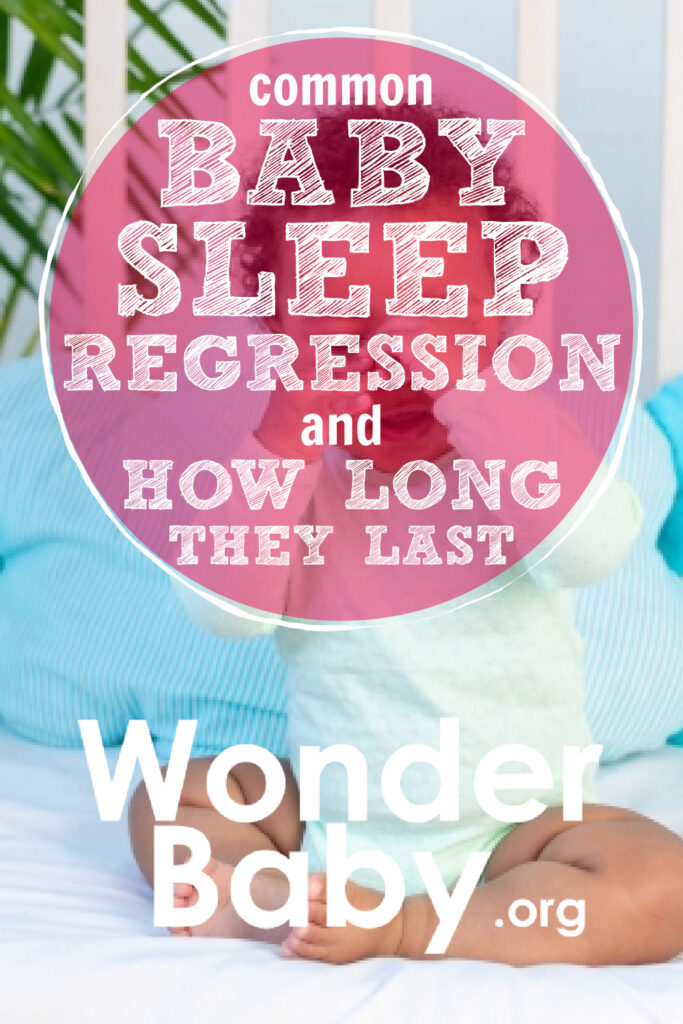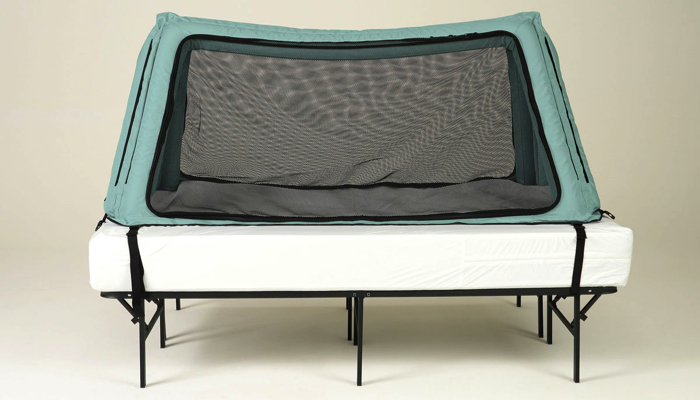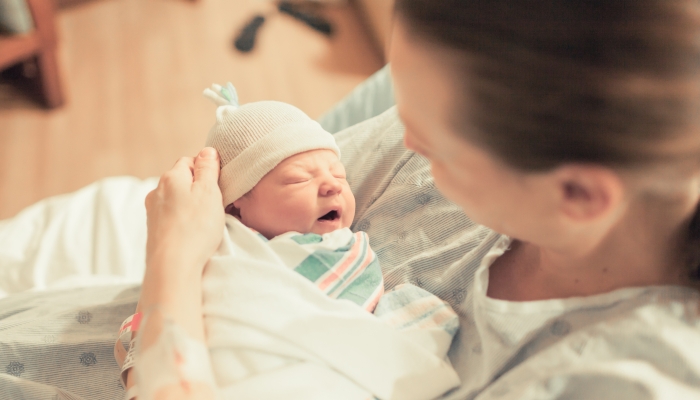Common Baby Sleep Regression Ages & How Long They Last

- Sleep regressions are common during your child’s first 2 years of life, with most occurring in the first year.
- They’re a normal part of your child’s physical, mental, and emotional development.
- Establishing healthy sleep habits early can help make sleep regressions go more smoothly.
- Ask for help from friends and family members, and always follow safe sleep practices.
The first year of your baby’s life can be exhausting. First, your newborn may have their days and nights mixed up, leaving you up caring for an infant around the clock. And just when your baby starts sleeping in longer stretches at night and you think you’re in the clear—a sleep regression hits.
While your baby’s sleep patterns may seem unpredictable, most babies go through sleep regressions at expected times in their development. Keep reading to find out common sleep regression ages, how long they last, and how to get through them without losing your sanity.
What Is a Sleep Regression?
A sleep regression is when a baby who normally sleeps well begins waking frequently at night for a period of time. During a sleep regression, your baby may also have difficulty falling asleep at bedtime. This can last for a few weeks or longer, leaving both you and your baby exhausted.
Baby sleep regressions happen for a number of reasons, including:
- Brain development
- New teeth coming in
- Working toward new milestones
- Growth spurts
- Illness
- Sleeping somewhere new (like on vacation)
- A change in routine
- Separation anxiety
Any of these situations can disrupt your baby’s sleep cycle. Even if you try to keep your baby’s bedtime routine consistent, you can end up with an overstimulated baby that can’t fall asleep.
How Do You Know if a Baby Is Going Through Sleep Regression?
The tell-tale sign that your baby is going through a sleep regression is when your normally good sleeper suddenly has sleep problems. Maybe you’ve already been working on your chosen sleep training method and it’s been going well—until it’s not.
Many parents assume that once they’ve made it through the newborn stage and sleep training, they won’t have sleep problems anymore. But reaching developmental milestones, teething, and changes in routine can disrupt nighttime sleep.
Here are the signs your baby may be going through a sleep regression:
- Frequent night waking
- Difficulty falling asleep
- Short naps
- Fighting sleep
- A fussy, overtired baby
- A clingy baby
During a sleep regression, it can be a struggle to get your baby to sleep without being held. Their sleep cycles may be disrupted, resulting in short periods of light sleep instead of their normal restful sleep. If you’re exhausted, you’re not alone.

What Are the Most Common Baby Sleep Regression Ages?
While some sleep regressions are unpredictable, there are certain ages when you can expect your child to go through a regression. That’s because many sleep regressions are the result of developmental milestones and physical changes like teething. But keep in mind that illnesses and other unpredictable factors can cause a sleep regression at any time.
Look out for these common sleep regression ages:
6 Weeks
Around 6 weeks of age, most babies go through a growth spurt that leads to the first sleep regression. The 6 week sleep regression can be tough on new parents, since newborns already only sleep in 2 to 4 hour stretches. You can expect your baby to need more frequent feedings during this regression, which may mean they wake up every hour or two.
This is also often the peak age for newborn fussiness and colic. At this age babies are beginning to come out of the sleepy newborn phase and notice the world around them. The new sights and sounds can be overwhelming to your baby. Because of this, you may have an extremely fussy and clingy baby on your hands.
4 Months
Babies go through a lot of changes around 4 months of age, which is why most babies go through the 4-month sleep regression. As your baby outgrows the newborn stage, their sleep patterns go through changes, including consolidating naps and nighttime sleep. But they also begin to cycle between light and deep sleep more frequently than they did as a newborn.
Around this age, babies will also begin teething and meeting other big milestones. Their vision is improving and they’re more interested in the people and world around them. They’re probably working on rolling and pushing themselves up off the floor, too. All of this can be very exciting and frustrating for your little one.
If you’ve gotten used to your baby sleeping through the night (which is really only 5 or 6 hours at this age), this is a tough one. If they’re teething, they could be waking frequently from the pain as well. The 4-month sleep regression is often one of the toughest for parents—hang in there!
6 Months
Not all babies go through a 6-month sleep regression, but some do. Like other sleep regressions, this one could be due to a growth spurt, teething, or developmental milestones. Six months of age can be a very exciting time for you and your baby because of all the changes they’re going through.
At this age, your baby is becoming increasingly aware of their surroundings and learning to do new things. They’re playing, laughing, communicating, and learning to sit up. Most babies begin to eat solids at this age, too. The significant growth that happens during this stage can affect your baby’s sleep.
If you’ve been hearing that your baby should be sleeping through the night by 6 months of age, you’re probably wondering why your baby wont sleep. And while it’s true that some babies finally begin to sleep more at this age, a 6-month sleep regression is totally normal.
8 to 10 Months
Sometime between 8 and 10 months of age, many babies go through a sleep regression. This is sometimes called the 8-month sleep regression, 9-month sleep regression, or 10-month sleep regression. But the exact timing of this regression can vary depending on your baby.
At this age, your baby can become restless for a number of reasons. They are most likely getting some of their first teeth in. The rapid brain development and physical development they’re going through can also disrupt your baby’s sleep patterns. It may just be too exciting to sleep!
Separation anxiety can also contribute to the 8-month sleep regression. At this age, babies are just beginning to develop the awareness that mom or dad isn’t with them at all times. While this is an important part of their emotional development, it can be disruptive to infant sleep.
12 Months
Once you’ve made it through your baby’s first year, you might think your sleep problems will be over. And if you’ve gotten used to your baby having a more consistent sleeping pattern, the 12-month sleep regression can come as a surprise. This sleep regression is likely caused by much of the same factors as the 8- to 10-month regression.
Teething, separation anxiety, and reaching new milestones are often to blame. At this age, parents may also be getting serious about their baby sleep plan, which can take some time for your little one to adjust to. 3
Toddler Sleep Regressions
It’s common to go through a toddler sleep regression around the 18-month and 2-year mark. But these toddler sleep regressions are a bit different from infant regressions. If your little one suddenly starts waking in the middle of the night or resisting naps or bedtime, you may be in the midst of a toddler sleep regression.
Unlike your infant, your toddler will be able to communicate much of their needs and wants to you. They may wake up frequently asking for a drink, a favorite stuffed animal, or to go to the bathroom. They may be transitioning to one nap or potty training at nap time, which can temporarily disrupt toddler sleep patterns.
At this age, toddlers often begin having fears about monsters or having nightmares, which can disrupt sleep too. While it can be alarming when your child wakes up from a bad dream, this is just one way they process the world around them. Just like with an infant sleep regression, all of this can lead to one cranky or clingy toddler during the day.
How Long Does Sleep Regression Last?
Most sleep regressions last anywhere from 2 to 6 weeks. So hang in there, because this is just a temporary phase. And if you’re currently going through a sleep regression, remember that it’s a normal part of your baby’s brain development.
While most sleep regressions feel like a short setback, the 4-month sleep regression marks a permanent change to your baby’s sleep patterns. But this doesn’t mean they’ll be waking up all night forever. It just means that you may need to start working harder on promoting good sleep habits.

How to Effectively Handle a Sleep Regression
Fortunately for exhausted parents everywhere, there are some steps you can take to help your baby sleep during a sleep regression. While there’s nothing you can do to skip or shorten this process, you can begin to begin to promote healthy sleep habits. This can help you make it through a sleep regression in one piece.
Follow these tips for surviving sleep regressions:
- Promote healthy sleep habits.
Pediatric sleep experts have trusted strategies to help your infant sleep, including:
- Establishing a good bedtime routine.
- Avoid stimulating activities close to bedtime.
- Putting baby to bed drowsy but awake.
- Using blackout curtains or white noise.
- Comfort your baby with patting or shushing without removing them from their crib.
- Keep a consistent routine.
- Prevent overtiredness.
Having a consistent nap and bedtime schedule is important for preventing overtiredness. While you want your baby to get plenty of stimulation during the day, it’s also important for them to rest. It may be tempting to let your baby skip naps, but this often leads to an overtired baby who won’t settle.
- Try new sleep solutions.
You may want to consider sleep training your baby, especially after the four month sleep regression. By this age, your baby may be old enough to learn to fall asleep without rocking or nursing to sleep. The chair method and pick up put down method are gentle sleep training methods that can work well during a regression.
Toddlers over one year of age may benefit from having a transitional object like a blankie or a favorite stuffed animal at bedtime. This can help them to feel safe and secure when they wake up at night. Just keep in mind that your baby should always be alone in their crib before their first birthday.
- Ask for help from family and friends.
Having a family member help you out during a sleep regression is important for your sanity and your baby’s safety. See if your partner or a grandparent can watch the baby for a bit so you can get some much needed rest.
- Follow safe sleep practices.
In your exhaustion, it can be tempting to let your baby sleep in your bed during a regression, but it’s important to follow the safe sleep guidelines pediatricians recommend. Always place your baby to sleep alone on their back in a crib. Falling asleep with your baby in your bed or arms is dangerous.
FAQs
Can You Prevent Sleep Regression?
Unfortunately, there’s nothing you can do to prevent a sleep regression. Sleep regressions are a normal part of your child’s physical, mental, and emotional development. This means the best you can do is take steps to make the process go more smoothly and remember that it’s temporary.
When Should I Consult My Doctor About a Sleep Regression?
Sleep regressions are a normal part of your child’s development. The American Academy of Pediatrics (AAP) stresses that sleeping through the night without waking isn’t really healthy for babies. Frequent wakings help to ensure that your baby is getting enough oxygen and breathing properly. But the AAP also states that if your child isn’t growing steadily or feeding well, then you should reach out to a pediatrician about their night wakings.
Should I Let My Baby Cry It Out During Sleep Regression?
If you’re comfortable with it, it’s okay to let your baby cry it out during a sleep regression. While newborns shouldn’t be left to cry for long periods, older babies can respond well to this method. Remember that the cry it out method doesn’t mean you leave your baby to cry all night. Check on your baby periodically to comfort them before leaving again.

The information WonderBaby provides is not intended to be, and does not constitute, medical or other health advice or diagnosis and should not be used as such. Always consult with a qualified medical professional about your specific circumstances.
Related Posts

Sleep, Special Needs
Safe Place Bedding Travel Bed Review
Traveling with a special needs child can be stressful! Having a safe, durable, and easy to use travel bed can make traveling so much easier!

Sleep, Special Needs
Sleep Regimen for Premature Babies: Special Considerations
It can take premature babies much longer than their full-term peers to sleep for long stretches. A preemie sleep schedule may encourage better sleep.

Sleep
Mastering the Bedtime Routine: 3 Tips for a Peaceful Night’s Sleep
From around six weeks, a newborn bedtime routine can help your baby learn the difference between day and night and prepare for a restful night’s sleep.